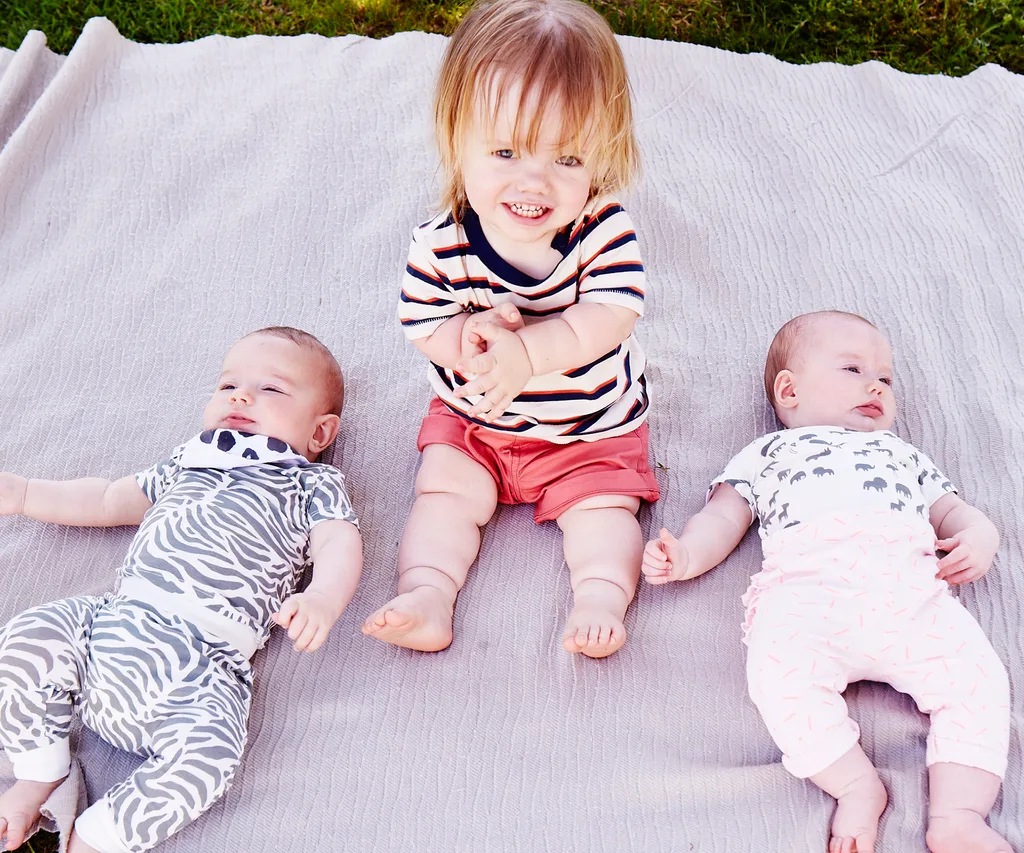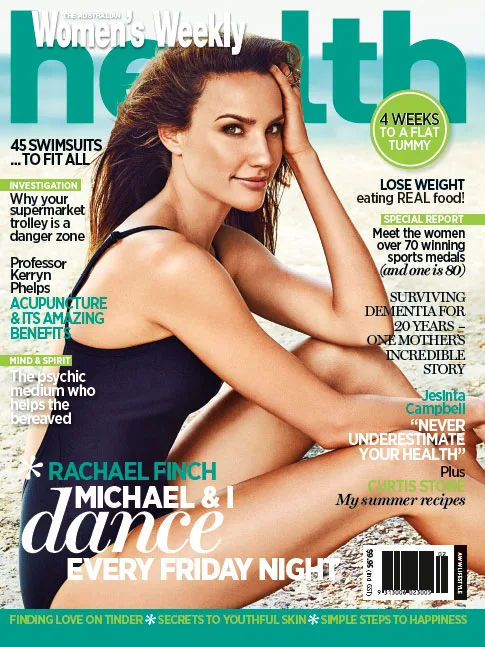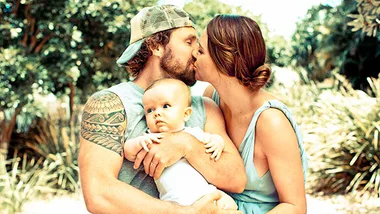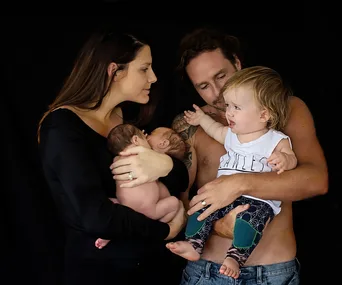When Jade Morley first held her twin babies, Harrison and Cleo, in her arms after their birth in April, she couldn’t help but be overcome by the strongest emotions. “There was a rush of joy, a rush of tears and a rush of the utmost relief that they were both okay,” says Jade, whose first child, son Floyd-Henry was born with achondroplasia, a random genetic condition also known as dwarfism.
Yet Jade was also acutely aware that these deep emotions were exactly the same as those that coursed through her as she held Floyd-Henry for the first time, though this time, Jade had the reassurance that Harrison and Cleo’s future health and wellbeing is certain.
For the first five months of Floyd-Henry’s life, what began as certainty and ecstatic happiness slowly gave way to anxiety, as Jade and her husband Ross struggled to understand why their baby was failing to meet his physical milestones.
“When we took Floyd to our paediatrician for his first check-up after coming from the hospital, he looked at some of the test results and told us that it looked like Floyd would be a little shorter than his peers,” recalls Jade, 33.
“That was okay with us; we could handle that. We were just happy that everything else was fine and that he was in our lives.”
However, not everything was fine. Floyd-Henry kept missing those baby milestones – instead of rolling over as most babies manage by themselves, he stayed on his stomach.
Instead of crawling as his motor-coordination improved, he “commandoed” his way across the floor with his arms, dragging his legs behind him.
“He had a lot of trouble with tummy time,” recalls Jade. “Although we didn’t know it at the time, his bones were growing at a very slow rate, but everything else – his muscles and his ligaments – were growing normally.
Everything was all stretched out, so he had very low muscle tone. “We took him back to the paediatrician because he wasn’t meeting his growth motor milestones and his legs were short and very chubby. I just thought, ‘They’ll say he’s just a little behind where he should be’.”
What Jade and Ross, from Casuarina on the NSW North Coast, didn’t know was that Floyd-Henry had no chance of making his milestones. He was born with undiagnosed achondroplasia, a condition that affects the growth of the long bones in the arms and legs. The world knows achondroplasia as dwarfism, although many now regard this term as demeaning.
Jade and Ross, 35, say the diagnosis came as a shock. “I cried and cried and cried,” says Jade. “He was our first child and I couldn’t help but think of what his future life would be like – the bullying, the exclusion, the teasing. It was the worst day of my life. We just fell into a deep depression. We couldn’t understand how this could happen. We totally freaked out. This couldn’t be happening.
“I just wanted to fix him and that was the hardest thing because I also knew there was nothing that I could do.”

Floyd-Henry, now two and as beautiful a boy as you are ever likely to find, suffers from a complicated and little understood affliction.
Achondroplasia – which occurs in about one in 25,000 people – results when a random mutation occurs in the fibroblast growth factor receptor 3 gene (FGFR3).
In most people, this gene has no regulatory effect on bone growth, but if the gene mutates, it becomes extremely active, resulting in shortened bones. It only takes the presence of one mutated protein within the gene to cause achondroplasia. The presence of two mutated genes proves lethal, usually shortly after birth.
Also, although achondroplasia is a genetic mutation, it can happen spontaneously even when neither parent – as in Jade and Ross’ case – carries the gene.
“When we found out, we were in denial,” says Jade. “We felt, ‘This isn’t right’, because Ross and I don’t have the gene. But ultimately, it is just one protein that makes the difference.
It wasn’t so much because he was a little person, but more because of everything that he would have to face in his life – the health complications, the social stigma. Like many people, we didn’t understand.”
Slowly, however, those feelings of fear, anxiety, and, in some senses, grief gave way to emotions that are far stronger – acceptance and hope.
“Having Floyd-Henry is where our journey began and what lay ahead of us was our new ‘normal’, our new life,” says Jade. “Floyd-Henry is such an amazing little boy. He is really an incredible, gentle, kind soul. I couldn’t wish any more for my children. I want them to grow up to be just that – kind, gentle people.
“When ‘difference’ becomes part of your world, you grow and view the outside world differently. We’ve found that if you are able to let the seed of acceptance grow within you, then a diagnosis such as this can enrich your life and even make you a better person.”
In the months after their son’s diagnosis, Jade and Ross made a video to explain to their friends what had happened. “We found that we had to explain it to people time and time again and, emotionally, that was draining.
“So we made a video and put it on the web. By then, we were proud and pumped about his life, and what we didn’t want was pity. It was really just for our family, but then, almost overnight, it went viral and Floyd- Henry became a kind of celebrity for acceptance right around the world. It seemed like it was meant to be that way.”
Floyd-Henry is doing far better than many predicted. “We now love the fact that Floyd is a little person,” says Jade. “He’s a little kid and he’s going to be a little person, and we love that. We have been lucky because he hasn’t had some of the health complications, though we know he may well in the future. Floyd seems to have a milder case of achondroplasia, if that is possible.”
Then, last year, Jade and Ross discovered they were pregnant again. “My initial reaction was tears and crying,” says Jade. “I was feeling that no, I can’t do this. At the time we found out we were having twins, it was hard because Floyd-Henry was 15 months old and wasn’t walking.
“He could crawl along the floor with his arms, but couldn’t crawl and wasn’t close to walking. I had to hold his hands to help him get up on his legs and if we were not doing that, then he was just screaming at us constantly because he wanted to go places and he couldn’t.
So when we found out that we were having twins on top of that, it was overwhelming.”
Nevertheless, they weren’t afraid that lightning would strike twice. “The chances of another child having achondroplasia were a million to one. We were told that it has never happened anywhere in the world,” says Jade. “Our doctor described it as if you had a document with a million words in it and the mutation was that one letter in one word out of place. The chances that would happen again are almost nil. So we were confident that the twins would be okay.”
Even so, the first thing Jade asked when she went for her first ultrasound was, “‘Are the leg and arm bones the right length?’ – but asking that question was just seeking reassurance,” says Jade. The twins are now seven months old.
“We wanted Floyd-Henry to have someone else in his life, someone close to his age, a little buddy to go through life with,” says Jade. “And now he has two people to go through life with.
That means so much to us. And he is such a wonderful big brother to them, too, which is fabulous because he’s their big brother and little brother, as well.
“He’s always taking time to give them attention and little pats or a hug. He’s such a great little guy. And we’re really excited for the future these three will have together.”
A version of this story first appeared in The Australian Women’s Weekly Health Special 2015.

You might also like: Paris Jackson discusses cyber-bulling with Oprah



